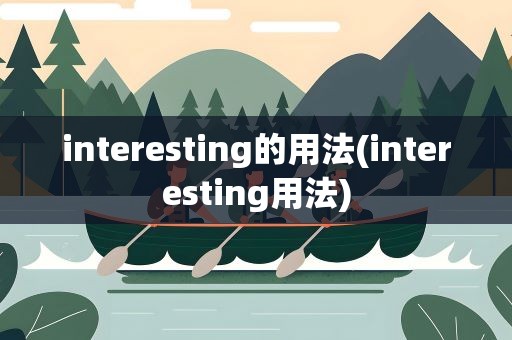interest interested 和interesting的区别和用法
interest,interesting和interested的意思都与“兴趣”有关,具体区别如下:

1、interest
n.趣味;v.使(人)发生兴趣,其主语多为事物
【例】sth.beofgreatinterest....很有趣
Yourstoryinterestsme.你的经历引起了我的兴趣。
2、interesting
adj.有趣味的,引起兴趣的;着重于主动意味;可作表语或定语;能修饰人,也能修饰物。
Thisnewbookisveryinteresting.这本新书很有趣。
She’samostinterestingman.她是个很有趣的人。
3、interested
adj.感兴趣的,对……有兴趣的,着重于被动意味,其主语一般为人,且多在系动词be,get,become等后作表语。
【例】Attheageofeight,thegirlbecameinterestedinboating.
扩展资料:
(1)She'dlikedhimatfirst,butsoonlostinterest
她刚开始是喜欢他,但很快就失去了兴趣。
(2)Foodwasofnointeresttoheratall.
食物一点都提不起她的兴趣。
(3)AsawriterIaminterestedincharacterization.
作为作家,我对人物塑造感兴趣。
(4)Itbotheredmethatboysweren'tinterestedinme
男孩子们对我不感兴趣令我很烦恼。
(5)Ihaveaninteresting,well-paidjob,withopportunitiestotravel.
我的工作很有趣,薪水又高,而且有很多旅行的机会。
interesting用法
固定短语有:interestingfor/todosth;intheinterestof等。扩展资料interesting作为形容词是“有趣的;引起兴趣的';令人关注的;令人感兴趣的”的意思,固定短语有:interestingfor/todosth;intheinterestof等,比如Itisaninterestingbookforchildren。
interesting的固定搭配
interesting的固定搭配:
1、interestingfor对…来说是有趣的
Itisveryinterestingforthem.对他们来说,这太有趣了。
2、interestingto对…来说是有趣的
It'smoreinterestingtotakethecoastroad.走海滨公路更有趣。
interesting用法:
interesting的意思是“令人感兴趣的,有趣的”,指人或物时,表示具有能唤起某人心理或情感方面兴趣的能力,而不表示兴趣的程度或原因;指书、戏剧、影视等时,则表示具有较强的娱乐性,而且能使人消愁解闷。
interesting在句中可用作定语、表语或宾语补足语。
interesting的比较级和最高级是moreinteresting和mostinteresting。

